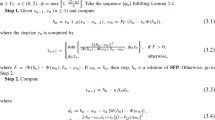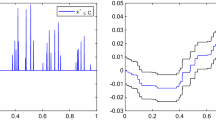Abstract
In this paper, by combining Polyak’s inertial extrapolation technique for minimization problem with the viscosity approximation for fixed point problem, we develop a new type of numerical solution method for split feasibility problem. Under suitable assumptions, we establish the global convergence of the designed method. The given experimental results applied on the sparse reconstruction problem show that the proposed algorithm is not only robust to different levels of sparsity and amplitude of signals and the noise pixels but also insensitive to the diverse values of scalar weight. Further, the proposed algorithm achieves better restoration performance compared with some other algorithms for image recovery.










Similar content being viewed by others
Data availability
The data used to support the findings of this study are available from the corresponding author upon request.
References
Byrne, C.: Iterative oblique projection onto convex sets and the split feasibility problem. Inverse Probl. 18, 441–53 (2002)
Calamai, P., Morè, J.: Projected gradient methods for linearly constrained problems. Math. Program. 39, 93–116 (1987)
Candés, E., Romberg, J., Tao, T.: Robust uncertainty principles: exact signal reconstruction from highly incomplete frequency information. IEEE Trans. Inf. Theory 52(2), 489–509 (2006)
Censor, Y., Elfving, T.: A multiprojection algorithm using Bregman projection in a product space. Numer. Algorithms 8, 221–239 (1994)
Clarke, F.H.: Optimization and nonsmooth analysis (2nd edn), Classics in Applied Mathematics 5. SIAM, Philadelphia (1990)
Dang, Y., Sun, J., Xu, H.: Inertial accelerated algorithm for solving a split feasibility problem. J. Ind. Manag. Optim. 13, 1383–1394 (2017)
Liu, Y., Hu, J.: A neural network for \(l_1-l_2\) minimization based on scaled gradient projection: Application to compressed sensing. Neurocomputing 173(3), 988–993 (2016)
López, G., Martn-Márquez, V., Wang, F., Xu, H.: Solving the split feasibility problem without prior knowledge of matrix norm. Inverse Probl. 8, 374–389 (2012)
Maingé, P.: Strong convergence of projected subgradient methods for nonsmooth and non-strictly convex minimization. Set Valued Var. Anal. 16, 899–912 (2008)
Marino, G., Xu, H.: A general iterative method for nonexpansive mappings in Hilbert spaces. J. Math. Anal. Appl. 318(1), 43–52 (2006)
Nocedal, J., Wright, S.: Numerical optimization. Springer-Verlag, New York (1999)
Polyak, B.: Some methods of speeding up the convergence of iteration methods. Ussr Comput. Math. Math. Phys. 4(5), 1–17 (1964)
Sahu, D., Cho, Y., Dong, Q., Kashyap, M., Li, X.: Inertial relaxed CQ algorithms for solving a split feasibility problem in Hilbert spaces. Numer. Algorithms 87, 1075–1095 (2021)
Suantai, S., Pholasa, N., Cholamjiak, P.: The modified inertial relaxed CQ algorithm for solving the split feasibility problems. J. Ind. Manag. Optim. 14(4), 988–993 (2018)
Suparatulatorn, R., Charoensawan, P., Poochinapan, K.: Inertial self-adaptive algorithm for solving split feasible problems with applications to image restoration. Math. Methods Appl. Sci. 3(42), 7268–7284 (2019)
Xu, H.: Iterative algorithms for nonlinear operators. J. London Math. Soc. 66(1), 240–256 (2002)
Yang, Q.: On variable-step relaxed projection algorithm for variational inequalities. J. Math. Anal. Appl. 302, 166–179 (2005)
Zarantonello, E.H.: Projections on convex sets in Hilbert space and spectral theory, Contributions to Nonlinear Functional Analysis. Academic Press, New York (1971)
Xu B., Liu Q., Huang T.: A discrete-time projection neural network for sparse signal reconstruction with application to face recognition. IEEE Trans. Neural Netw. Learn. Syst. (2018)
Garg, K., Baranwal, M.: CAPPA: continuous-time accelerated proximal point algorithm for sparse recovery. IEEE Signal Process. Lett. 27, 1760–1764 (2020)
Abubakar, A., Kumam, P., Mohammad, H., Awwa, A.: A Barzilai-Borwein gradient projection method for sparse signal and blurred image restoration. J. Frankl. Inst. 357(11), 7266–7285 (2020)
Sakurai, K., Iiduka, H.: Acceleration of the halpern algorithm to search for a fixed point of a nonexpansive mapping. Fixed Point Theory Appl. 2014(1), 202 (2014)
Acknowledgements
H. Che was supported in part by National Natural Science Foundation of China (NSFC) (No. 11401438) and Natural Science Foundation of Shandong Province (No. ZR2019MA022, ZR2020MA027). Y. Wang was supported in part by NSFC (No. 12071250) and Shandong Provincial Natural Science Foundation of Distinguished Young Scholars (No.ZR2021JQ01) . H. Chen was supported in part by National Natural Science Foundation of China (NSFC) (No. 12071249).
Author information
Authors and Affiliations
Corresponding author
Ethics declarations
Conflict of interest
All authors declare that they have no conflict of interest.
Additional information
Publisher's Note
Springer Nature remains neutral with regard to jurisdictional claims in published maps and institutional affiliations.
Rights and permissions
Springer Nature or its licensor holds exclusive rights to this article under a publishing agreement with the author(s) or other rightsholder(s); author self-archiving of the accepted manuscript version of this article is solely governed by the terms of such publishing agreement and applicable law.
About this article
Cite this article
Che, H., Zhuang, Y., Wang, Y. et al. A relaxed inertial and viscosity method for split feasibility problem and applications to image recovery. J Glob Optim 87, 619–639 (2023). https://doi.org/10.1007/s10898-022-01246-9
Received:
Accepted:
Published:
Issue Date:
DOI: https://doi.org/10.1007/s10898-022-01246-9




